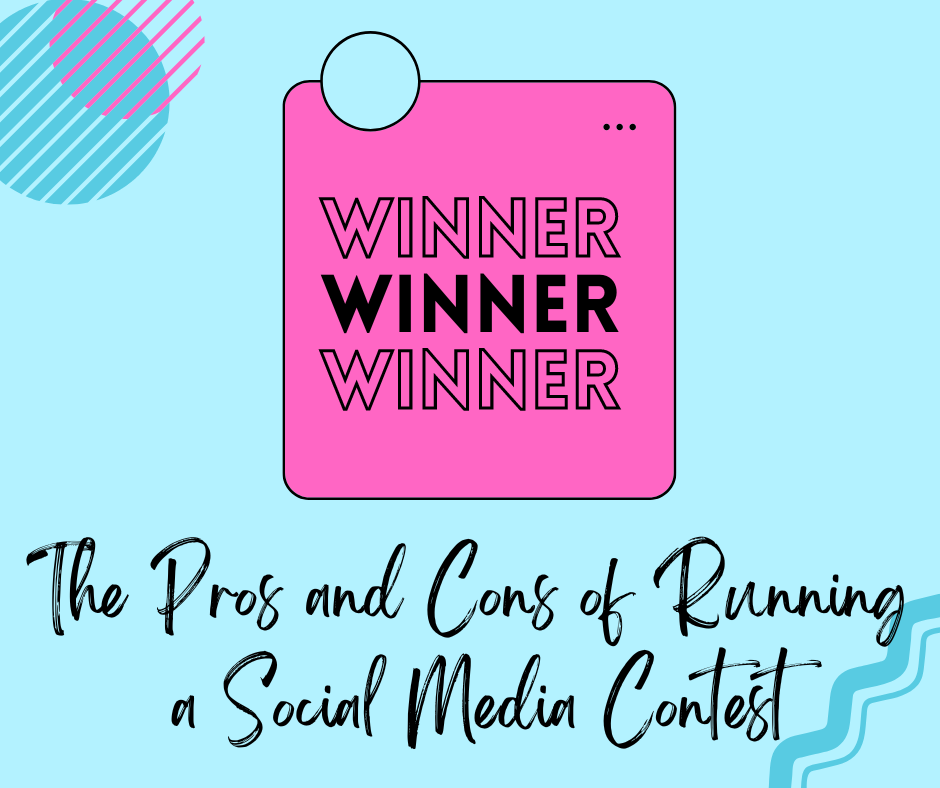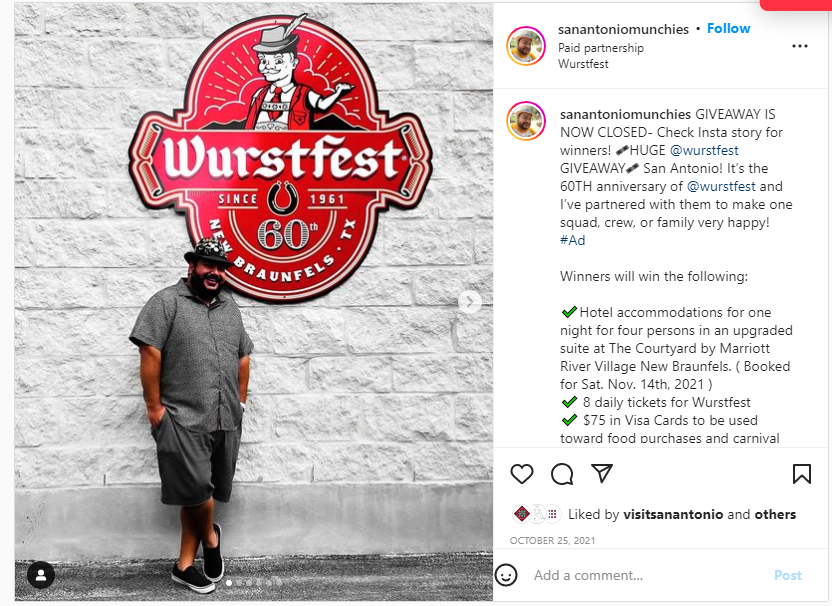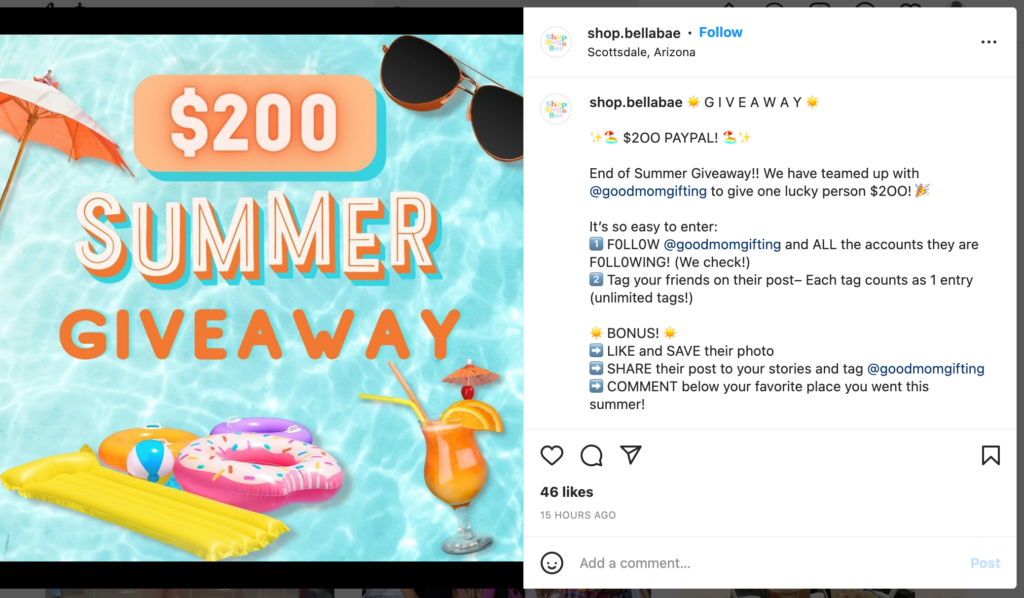
Why Run a Contest?
It’s tempting to think that running a contest on your social channels can enhance your social media practice. Contests used to be a great way to add engagement to your social channels, but today they are often time-consuming and may not always bring the return you are hoping for. The glut of content on social channels combined with the punishing algorithm on Facebook and Instagram make it harder and harder to use contests in any meaningful way.
If you’re still considering this activity for you or a client, here are some guidelines and best practices to help you navigate it.
Contest Type
A contest on social media usually involves some type of giveaway or prize. It typically involves the consumer taking some action to gain entry to the contest. Many brands use them to build engagement on their channels (talk value, getting others to enter) which is far more prevalent than using contests for new followers.
How to Select a Channel for Your Contest
Contests are perceived differently on each social channel. They began with a heavy Facebook focus in 2009/2010 when Facebook switched from brands having personal or “friend” pages to business pages. Contests have migrated away from Facebook and are now focused more on Instagram because Instagram has more friendly giveaway rules on its app. Contests never gained any traction on Pinterest because of the nature of this social channel. It is rare to see contests on Twitter, except to promote a larger sweepstakes style contest. These are usually hosted on a brands’ website with the objective of building email subscribers.
Third Party Apps to Manage Contests
For contests that involve some kind of content creation, it is advisable to utilize a third-party app to manage them. It’s very difficult for a brand to spin up a site to house photos, videos, artwork, etc into the compressed timeframe of a contest. These apps also allow for public voting, which was a contest trend about 7-10 years ago when crowdsourcing was considered highly authentic. But voting contests have fallen out of favor because it’s too easy for hackers to game the system, eliminating the authenticity of the contest. (Just Google “Boaty McBoatFace” and you’ll see!)
Some third party apps to assist in running contests include: Wishpond, Rafflecopter and WooBox.
Perceived Value of the Prize
In the early days of contests, consumers would do anything for a $5 Starbucks gift card giveaway on Facebook. That is no longer the case. The networks are so large and so many businesses are fighting to get seen on Facebook and Instagram (the primary places you see contests), the value of the prize is the key to a successful giveaway. Even a $100 value prize (in gifts or gift cards) is a hard sell. Many influencers doing “loop” giveaways on Instagram are pooling prizes together for a giveaway value of $1000 to make them desirable and successful to their audiences.
Experience prizes can be very desirable for contests, but these are usually really sweepstakes prizes that are housed and run on a brand’s website which are only PROMOTED in social media. A sweepstakes has a specific definition state by state and every business is responsible for understanding how to run a sweepstakes and following the laws for those types of giveaways.
An experience prize can be a trip to a special destination (Trip for four to the Virgin Islands) or to an event that has limited availability to the general public (You and a friend get courtside seats to the NBA Finals).
Contest Rules and Laws
Contest rules on the social networks change frequently and often without notice. Just because you did a specific giveaway last week, doesn’t mean it’s acceptable on that network today. Here are the contest guidelines for Facebook and Instagram
Facebook: https://www.facebook.com/policies_center/pages_groups_events
Instagram: https://help.instagram.com/179379842258600
Social media managers should stay apprised of the contest rules for the networks and how they intersect with the laws of the state in which their clients are based.
Ease of Entry
If in building a contest, you want to garner engagement or followers on client channels, then make it easy for them to enter. We see numerous contests that make a consumer take a lot of steps to enter. Example “like this post, tag a friend, share this post, like this channel,” etc. If you make it too hard, it restricts your entries to those who are ready to jump through the hoops. Many instructions for entering contest with marginal prizes often sound desperate with their confusing instructions. And from the content entrants’ standpoint, they have no way of knowing how vigilant the content sponsor is at making sure all the rules were followed.
Fulfillment
Once you’ve run your contest and selected a winner, you are most likely responsible for fulfillment. What does that mean? Securing the prize and mailing it to the winner. Or for the experience prize, securing the tickets, reservations, gift cards, etc and mailing/emailing all to the winner. Are there rules for verification of contests in the state you live? Check on what laws may be existent because once the winner has the prize package in their hands, they will be uninterested in further dialogue/requests from you.
Boosting Contest Desirability with Partnerships
A partnership is a great way to boost the desirability of a contest. Here are some models to follow:
- A brand gives/gifts influencers their new product to give away to their audiences. The brand has control over product distribution to the influencers, but the influencers do the heavy lifting to run and fulfill the contest.
- Two brands work together to run a contest, dividing the workload, prizes and fulfullment.
- Influencers often run contests and give away the “freebies” they get from other brands. Sometimes they group them into a big gift basket and sometimes they are one-off giveaways.
- Groups of influencers in an aligned space give away products in what is often called a “loop giveaway.” For example, six beauty influencers each contribute a product around a theme and they all try to get engagement by requiring everyone to follow the whole loop.
Here are some Contest Examples



So should you run a contest?
If you’re asking for the short answer, we would say no. With one notable exception, contests for our clients have been a lot of work for very little return. Now, if you want us to help you give away a trip for four to an exotic destination, let’s talk!
For further reading:
The Pros and Cons of Running a Social Media Contest
Social Contests: The Good, The Bad and the Ugly
We’d love to hear from you about your contest management experience!
